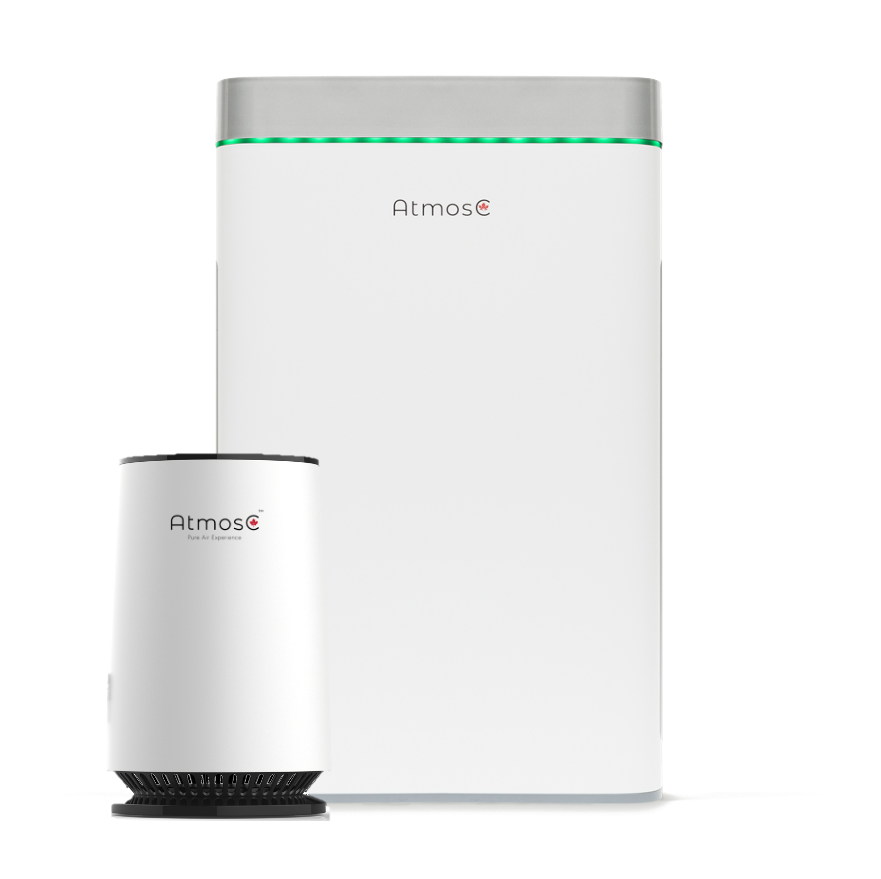The comfort of your home, your quality of life, and—above all—your health can be affected by the quality of the air you breathe inside your home. Are you a parent, homeowner, or pet owner who is wondering about the differences between a dehumidifier and an air purifier? You’re in the right place.
A quick look at the differences between an air purifier and a dehumidifier
To ensure the health of your family and maximize the comfort of your interior, it is crucial to understand the benefits of dehumidifiers and air purifiers.
It is important to understand that these two devices do not serve the same purposes. Indeed, although they may appear similar, they have distinct features and uses. While dehumidifiers regulate humidity levels for a healthier environment, air purifiers eliminate airborne particles and dust mites that pollute the ambient air.
To help you understand quickly, here is a table that summarizes their key differences:
|
|
Dehumidifier |
Air purifier |
|
Main function |
Reduces excess moisture in the air |
Filters fine particles, pollutants, and allergens and purifies the air |
|
Methods |
Uses absorbent materials such as silica gel to condense water vapour into liquid |
Uses various filters (HEPA, activated carbon filters) to eliminate impurities |
|
Advantages |
Prevents the appearance of mold spores due to a high moisture level |
Eliminates unpleasant odours and pet dander, and improves indoor air quality |
|
Capacity |
Eliminates water vapour, but does not deal with fine particles |
Unable to control humidity, but effective at ensuring better air quality |
What is an air purifier?
An air purifier is a device designed to clean the air in your home. It filters particles suspended in the air (such as dust), airborne allergens, and pollutants to guarantee you a healthy atmosphere.
How it works
An air purifier works using different filtration systems. HEPA filters, for example, are capable of capturing up to 99.97% of the fine particles present in the air. Active carbon filtration, meanwhile, eliminates odours and polluting gases. Finally, some types of air purifiers, such as AtmosC air purifiers, use ionization, which involves releasing negative ions to neutralize polluting particles.
Who is it for?
Air purifiers are perfect for people who have allergy symptoms to pet hair, people with asthma, or those who live in areas with high pollution. When choosing an air purifier, Health Canada recommends considering the effectiveness of the device at eliminating harmful particles suspended in the air, the surface area of the room to be purified, and potential ozone production.
What is a dehumidifier?
For its part, a dehumidifier is used to regulate ambient humidity. By extracting the excessive moisture present in the air, it creates an environment that is less conducive to the appearance of mold.
How it works
There are two main types of dehumidifiers: electrical and chemical. The first type uses the principle of condensation to collect water, while the second absorbs atmospheric moisture using substances such as silica gel.
Who is it for?
Dehumidifiers are particularly useful for those living in humid environments or in rooms conducive to condensation, such as bathrooms.
Air purifier vs. dehumidifier: How to make the right choice?
Choosing between these two devices depends on several factors. According to the IVAIRE project, improving ventilation and indoor air quality in the home through the use of a mechanical ventilation system resulted in a significant 22% reduction in respiratory symptoms in children with asthma.
High humidity problems
If you are struggling with excessive moisture in the air, a dehumidifier may be your best ally. It will help you reduce the humidity level for a healthier environment.
Dry air conditions
If you find the air inside your home too dry, you may need a humidifier, not a dehumidifier.
Allergies, asthma, and airborne pollutants
If you suffer from allergies or asthma or live in an area with high pollution, an air purifier could be the solution for you. It will filter the air in your home to make it healthier.
Frequently Asked Questions
What is the most effective device between a dehumidifier and an air purifier?
If you want to improve the air quality by filtering fine particles and allergens, an air purifier will be the most effective option.
Can a dehumidifier and an air purifier be used at the same time?
Yes, it is quite possible to use these two devices at the same time. The dehumidifier will take care of regulating the humidity level, while the air purifier will purify the air by eliminating harmful particles.
What is the necessary maintenance for an air purifier or a dehumidifier?
For an air purifier, the primary maintenance involves replacing the filters regularly, according to the manufacturer’s recommendations. A dehumidifier requires regular cleaning of the water tank and checking the evaporator and condenser to prevent clogs.


